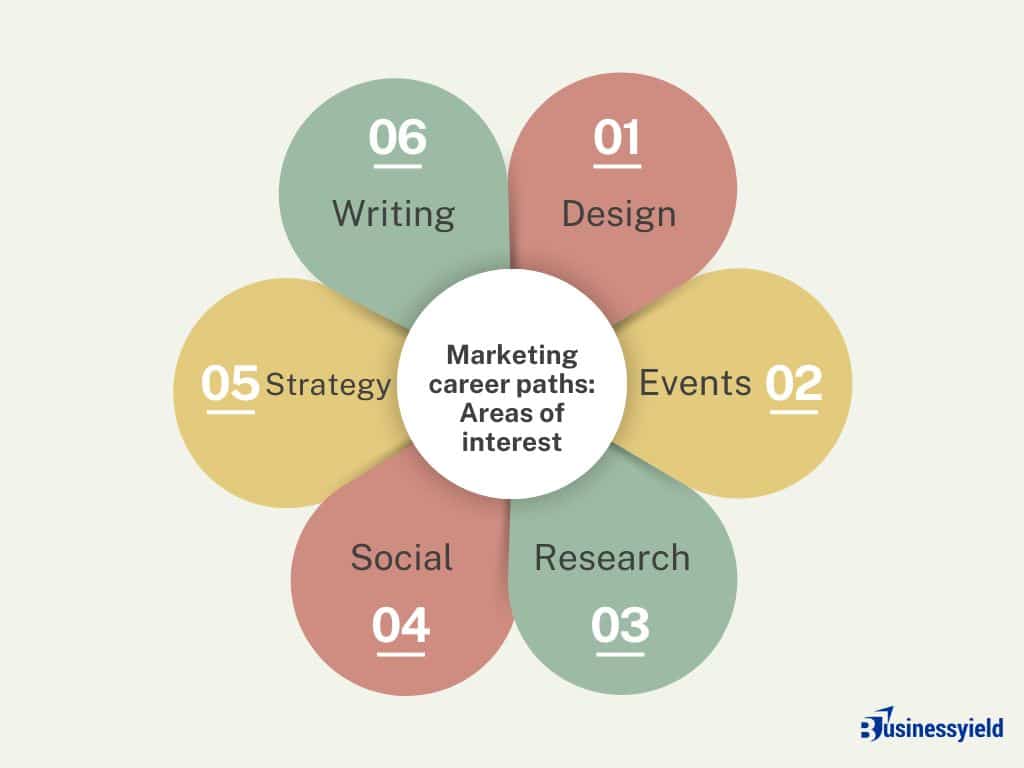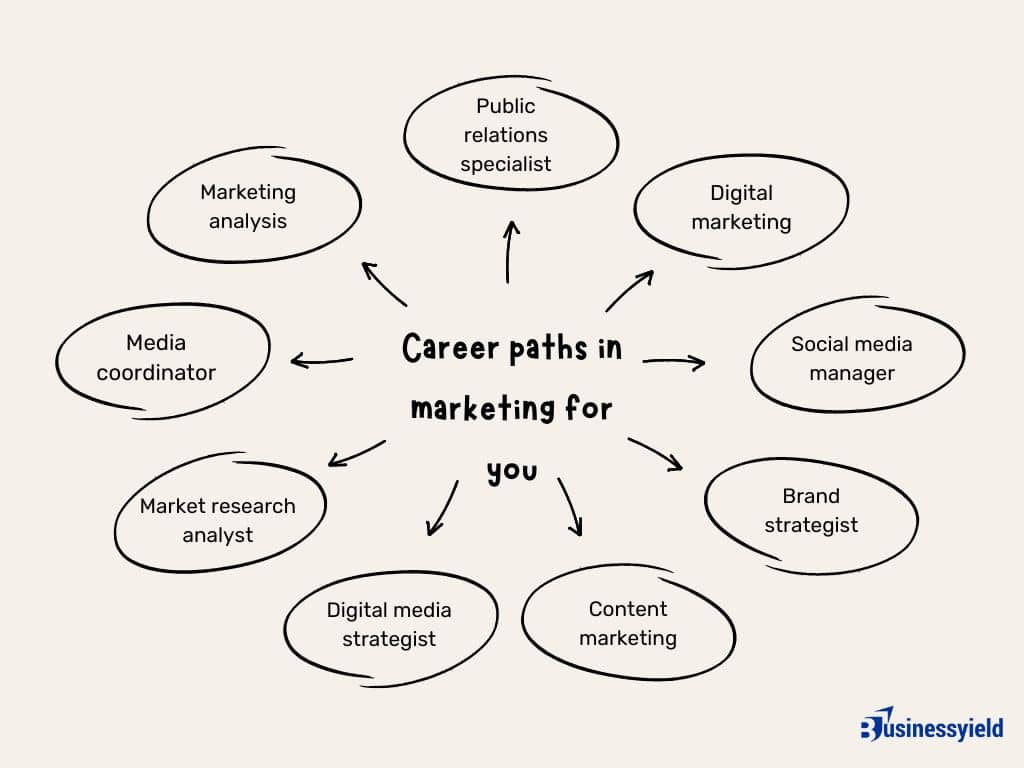As organizations focus more on driving more traffic to their websites and converting online leads, there is a growing need for experienced and knowledgeable marketing professionals. This has led to a significant spike in marketing career paths over the past 10 years.
The day-to-day activities of marketers depend on what they’re marketing, whom they’re targeting, and what platforms they use to promote products or services. There are too many marketing roles and functions to provide a single definition applicable to everyone in this field.
Though digital marketing careers have become more popular, marketing professionals can take different career paths.
Key Points
- Marketing is the practice of promoting brands, products or services.
- Within the different marketing career paths, there are several career options to explore depending on your interests.
- While experience in marketing is important, having a degree can help you stand out from other job applicants.
- Marketing jobs are in high demand because marketing and promotional campaigns are essential to every company as organizations seek to grow and maintain their market share.
What is marketing?
Marketing is the practice of promoting brands, products or services. It can include many specialized areas of expertise, such as brand or communications management. The specific tasks you engage in may depend on your individual role. For example, a marketing advertisement buyer might have different daily duties than a marketing social media manager.
Common duties marketing professionals or teams might handle are:
- Buying advertisement placements
- Developing promotional campaigns
- Maintaining social media platforms
- Managing strategic communications
- Implementing brand updates
Types of marketing degrees
While experience in marketing is important, having a degree can help you stand out from other job applicants. My marketing-specific degree introduced me to key marketing concepts that I use on the job. It also allows me to network with other marketing professionals.
You can receive a marketing degree at multiple academic levels, which might help you expand your skill set and continue to learn throughout your career. Before applying for admission, consider researching their individual requirements. Here are the different degree levels you can complete:
Bachelor of Science in Marketing
A Bachelor of Science in marketing can be a good degree for aspiring marketing professionals to gain the education necessary to thrive in the industry. Most programs focus on areas such as marketing research, advertising strategies, social media marketing, and consumer behavior.
READ: Affiliate Marketing Programs: A Comprehensive Guide to The Top Affiliate Marketing Programs
Bachelor of Science in Business Administration
Students who are interested in marketing but also want to understand how other parts of a company function should consider pursuing a Bachelor of Science in business administration. While earning this degree, students learn about marketing basics and also build knowledge in other disciplines, such as finance and accounting.
Associate’s degree
An associate-level marketing degree can provide a strong foundational knowledge of marketing strategies and practices. Examples of the topics you might study include:
- General business operations
- Best practices for communication
- Promotional campaign planning or management
Typically, you need at least 60 academic credits and a high school diploma or general education degree equivalent to earn an associate degree. If you’re a full-time student, it may take you two years to graduate, or longer if you’re a part-time student.
Master’s degree
Continuing your education to receive a master’s degree in marketing can expose you to more employment opportunities in the field, and you can gain new industry knowledge. Topics you might learn include:
- Statistics and analytics for marketing
- Consumers’ insights and decision-making
- Digital marketing methods and strategies
- Advertising and social media communications
You may also contribute to marketing research with professors or on your own. To complete a master’s, you usually need 30 to 40 academic credits, depending on the college or university you attend. Having a full-time work schedule while pursuing your degree can also influence the time it takes for you to finish.
Doctorate
Pursuing a doctorate focused on marketing can help you if you’re interested in teaching marketing studies at the collegiate level, becoming a professional marketing researcher or reaching top-tier leadership positions.
Here are some course topics you might encounter:
- Measurements of data analytics
- Information processing in marketing
- Advanced consumer research methods
- Consumer-centered marketing design
Usually, doctorate degrees require a dissertation research paper on a related topic, such as the importance of user personas for crafting strong consumer-centered marketing design. To complete this degree, you might need up to 120 credit hours.
The time to complete your doctorate can depend on how many courses you take at a time and how quickly you write your dissertation.
Marketing career paths: Areas of interest
Within the different marketing career paths, there are several career options to explore depending on your interests. Here are six areas to start:

1. Design
From distinctive logos to eye-catching packaging, designers create visual assets that set a company apart from its competitors and feed into larger campaign narratives. If you work in design, you’ll be responsible for several creative tasks that may include producing original art and infographics, editing and retouching photos, designing web pages for ultimate user satisfaction, or using research to inform your creative choices.
Skills: Creativity, attention to detail, project management, knowledge of design tools such as Adobe Creative Suite
Could be a fit if you like: Telling stories through visual mediums and creating assets that support a marketing team’s various visual needs
- Entry-level roles: Graphic design specialist, visual information specialist, web design specialist
- Mid-level roles: Creative project manager, design researcher, graphic designer
SEE: Free Graphic Design Software: The Ultimate Guide to Revolutionize Your Visual Content
2. Events
Companies hold events and experiences to increase their brand and product visibility. If you work in events marketing, you’ll be responsible for ideating and executing in-person or virtual events that support larger campaigns and strategies.
Skills: Planning, organization, vendor management, budgets, multitasking, communication
Could be a fit if you like: Putting together experiences, either in-person or virtual, that results in greater brand visibility, media attention, and customer engagement
- Entry-level roles: Experiential marketing coordinator, events marketing specialist, field marketing coordinator
- Mid-level roles: Experiential marketing manager, events marketing manager, field marketing manager
READ: DIGITAL MARKETING MANAGER: Meaning, Duties, Salary, Interview Questions & Resume
3. Research
Marketing teams rely on data-driven research to tailor and target everything from campaign messaging to product launches. Using myself as an example, when I conduct research, I use a variety of tools to figure out what customers need and want, and then translate my findings so my team can develop more impactful marketing strategies, campaigns, and more.
Key skills: Data analysis, critical thinking, communication
Could be a fit if you like: Finding and parsing information and using those conclusions to make strategic recommendations that improve a marketing team’s efforts
- Entry-level roles: Marketing assistant, market research associate, business analyst
- Mid-level roles: Market research analyst, global marketing analyst, social media analyst
SEE: Social Media Manager Salary: How Much Do They Make in 2024?
Companies must communicate about their brand and products across several digital channels. Social fosters a different level of interaction thanks to its direct engagement with customers. If you work in social media marketing, you’ll be responsible for generating and publishing content—written posts, videos, graphics, and more—that garner attention and propel conversation.
Skills: Writing, communication, creativity, planning, social media strategy
Could be a fit if you like: Being both creative and strategic about how to reach and engage customers, and producing multimedia content that supports larger brand and product strategies
- Entry-level roles: Marketing associate, social media marketing assistant, social media marketer
- Mid-level roles: Social media editor, social media manager, community manager
As of 2021, skills related to social media were in high demand. Needs for people with paid social media skills increased by 116% while social media advertising increased by 46%.
SEE: Managing Multiple Social Media Accounts: Tools And Tips For Success
5. Strategy
No matter which type of marketing you work in—product, brand, content, or otherwise—developing a well-researched and brand-specific strategy is instrumental to success. If you work in strategy, you’ll be responsible for identifying new ways to reach customers and developing plans that ensure each campaign is a success.
Key skills: Planning, communication, creative thinking, analytical thinking
Could be a fit if you like: Thinking strategically about a company’s marketing needs, and then developing and executing campaigns that generate greater awareness and sales
- Entry-level roles: Digital marketing strategist, product marketing strategist, SEO specialist
- Mid-level roles: Brand content manager, product marketing manager, senior SEO manager
READ: How Brand Partnerships Can Improve Consumer Engagement and Business Growth
6. Writing
Much in the way that companies rely on visuals to help create a unified brand image and tell a story, they need writers to do that very thing with language. If you work in some aspect of writing, you may be responsible for producing writing that exemplifies a brand’s voice, and developing content for different digital channels.
You may even manage internal or external communications.
Skills: Writing, communication, audience and engagement strategy, project management
Could be a fit if you like: Reaching audiences—be they internal employees or external customers—through the written word
- Entry-level roles: Junior copywriter, communications specialist, content writer
- Mid-level roles: Brand copywriter, marketing content writer, communications manager
SEE: What Does an SEO Copywriter Do?
10 career paths in marketing for you
If you’re interested in starting or growing your career in marketing, there are many career paths to consider. Today’s job market is thriving, and there’s more opportunity than ever to dip your toe into the proverbial marketing waters. But what are these specific opportunities, you ask?
Below we’ll break down the various marketing jobs and marketing career paths available.

1. Public relations specialist
Public relations specialists work to maintain positive perceptions about the brands they manage or the individuals they represent. For example, if a brand or individual is hosting a public event, you might promote it through various media channels to persuade people to attend. Other specific duties you may handle in this role are:
- Writing and helping present official press releases
- Understanding the client’s target audiences and using the best approaches to engage them
- Answering media questions and providing information
- Helping clients maintain positive relationships with the public through strategic communications
- Arranging promotional interviews for clients
- Assisting with fundraising efforts or donor relations
The size of the company you work for might influence the specific duties you manage. If you’re an in-house public relations specialist, you may only handle its brand. However, if you work for a marketing agency, you can manage public relations for multiple brand accounts at one time. In both scenarios, the audiences you’re addressing usually include donors, consumers, and journalists.
SEE: PUBLIC RELATIONS SPECIALIST: Definition, Salary, How to Become One & Skills
2. Digital marketing
Digital marketing refers to marketing through digital channels like search engines, websites, email, and mobile apps. In the last 30 years, the rise of the internet, smartphones, and big data has completely changed the way companies market and promote their products and services. In turn, these shifts create many new marketing careers.
Below are the sub-career paths under digital marketing:
Growth Marketing
Growth marketing (or hacking) is a relatively new term and refers to marketing that targets the entire funnel — not just the top few tiers. It takes into account the fact that retention is a major factor of growth and so it prioritizes both customer success and customer acquisition.
Search Engine Optimization (SEO) / Search Engine Marketing (SEM)
Search engine optimization refers to organically optimizing web content. This helps search engines index your content, which makes it easier for your audience to find.
Search engine marketing is paying for advertising space on said search engines. SEO, SEM, and their ever-changing trends have become such an influential part of online marketing that people are specializing in it — and companies are hiring for it, too.
Email Marketing
Email as a marketing medium may seem more traditional, but an email’s impact is still strong. It uses a single channel to reach current and potential customers through creatively written emails and digital promotions.
READ: How To Become A Digital Creator In Nigeria
Social media managers oversee a brand’s social media accounts, including posts and interactions. Some daily tasks you might perform in this role are:
- Creating diverse content for all social media platforms
- Posting content to social media accounts
- Interacting with followers
- Monitoring how consumers mention your brand
- Researching current social media content trends
If you’re working as a social media manager, you may consider using various resources. For example, maintaining a content calendar can help you organize content by date and platform as you develop posts. You might also use scheduling tools to arrange posts for release in advance or social media listening software to monitor mentions of your brand.
The primary purpose of social media managers is to increase brand awareness, followers and engagement levels.
SEE: Social Media Management: Easy Guide, Jobs & 21+SMM Tools (Free & Paid)
4. Brand strategist
Brand strategists typically work under the direction of brand managers to ensure all brand communications and visuals meet style guidelines effectively. Examples of duties you might manage in this position include:
- Developing style and tone for your brand
- Researching competitor brands
- Referencing research about consumer perceptions of your brand
- Collaborating with other marketing teams to meet brand goals
- Implementing brand updates or comprehensive refreshes as needed
If you work in a marketing agency, you can also present unique brand strategies to each of your clients to help guide their brands to higher levels of success. The primary goal of a brand strategist is to grow brand awareness and increase customer bases through the strategic positioning of brands.
READ: BRAND STRATEGY: Definition, Examples & Components of Branding
5. Content marketing
Content marketing, since it’s mainly executed online, could be considered a segment of digital marketing. But the career path has become so impactful that I believe it deserves its own section.
Content like blogs, ebooks, white papers, and guides are critical components of a solid inbound marketing strategy, and content marketers are the people who create them. Content marketing refers to marketing via long-form content, websites, blogs, and even audio and video content.
Content Creation
30% of social media marketers are investing more in short-form video in 2022, while 29% are trying it for the first time.
To keep up with this kind of trend, businesses are investing in content creation. Content creation focuses on digital content like video, podcasting, and other new media. This focus allows brands to connect with customers where they spend the most time online. This strategy can speed up business growth.
Marketing Copywriting
Copywriting is a foundational part of marketing and advertising. Content and copywriters create copy for:
- Blogs
- Websites
- Ads
- Landing pages
- Social media
They use language to encourage, educate, and inform. In the process, they entice customers to buy, stakeholders to engage, and leaders to support the business.
Social Media Marketing
Social media marketing leverages social platforms to promote a company and its products. Some specialize in one or two platforms, while others manage multi-channel promotion.
Social media marketing also helps brands connect and engage with audiences in new and authentic ways.
Graphic Design
This is a subset of content marketing that focuses more on the visual appeal of web and print content. Graphic designers typically work on:
- Website design
- Ad designs
- Infographics
- Images used in marketing or promotions
Community Management
Community management focuses on community-building for businesses. This role helps to connect customers, employees, and stakeholders.
Adding a community manager for engagement can help a brand:
- Improve brand reputation
- Share updates
- Grow with customer needs in mind
Conversion Rate Optimization (CRO)
The main goal of content marketing is to use content to educate, interest, and convert readers into customers. But content can’t always do that on its own. That’s where conversion rate optimization comes into play.
READ: The Definitive Guide To 2024’s Content Marketing Strategies: Master The Art, Crush The Competition
6. Digital marketing strategist
Digital marketing strategists focus on strategically placing brands in online spaces. For example, you might manage analytics for your brand’s website. Other types of duties you can manage in this role include:
- Documenting web-based analytics
- Designing web-based advertisements
- Implementing updates on brand websites
- Managing strategic email communications and campaigns
Typically, as a strategist, you can also use search engine optimization (SEO) best practices to help ensure all digital content is searchable for target audiences. For example, if digital content uses SEO, then it may show up in more search results and allow more consumers to engage.
READ: Digital Marketing Strategy: The Ultimate 2024 Digital Marketing Playbook
7. Market research analyst
Market research analysts help brands better understand target audiences to ensure they produce informed products or services and promotional efforts. This can include conducting different research sessions with consumers, such as:
- Collaborative focus groups
- Independent surveys
- Individual empathy interviews
For research, you may need to produce structured protocols prior to the sessions to share them with participants. This is important if you plan to record your sessions to complete permission forms. Once you’ve gathered your research, you can analyze the data to determine common consumer trends, thoughts or feelings.
Understanding your results can allow you to share consumer insights to help other marketing teams.
SEE: MARKET RESEARCH TOOLS: The 15 Best Market Research Tools in 2024
8. Media Coordinator
Media coordinators usually focus on making sure the brand has all the multimedia assets it needs for its promotional efforts. For example, if a brand purchased an upcoming commercial slot, a media coordinator might help produce the commercial or coordinate video production and editing operations.
Some examples of other media types these coordinators can manage include:
- Digital designs for graphics
- Print banners or signage
- Photography for images
While coordinating media, these professionals may work directly with designers, print producers, photographers, and videographers. Usually, media coordinators work in all specialized teams in marketing departments to ensure all assets are ready when needed.
READ: Social Media Planner: Trends, Tools, And Tactics To Prepare For The Ever-Changing Landscape
9. Marketing analysis
In the marketing world, numbers are king. No other factor has the power to shift campaigns, change budgets, hire and fire employees, and draw investors.
Marketing analysis is a unique role. While most companies hire internal analysts, third-party consultants, and agencies also exist to help businesses interpret and apply data findings. Regardless of whom they work for, data scientists — specifically marketing analysts — read and interpret digital data to help businesses and marketing departments make better business decisions.
READ: BEST MARKETING ANALYTIC TOOLS: Top Free and Paid Options
10. Promotions director
Promotions directors work to develop strong marketing campaigns to reach and engage target audiences. Specific duties these professionals might manage include:
- Developing promotional campaigns
- Consulting with external clients or other internal marketing teams
- Implementing promotional campaigns
Another duty is establishing promotional budgets yearly to ensure that marketing teams avoid overspending on campaigns. You can collaborate with financial teams within the company you work for internally or within your client’s company.
SEE: ADVERTISING AND PROMOTION: Effects of Advertising & Promotion on Small Businesses
How to get onto a marketing career path
According to Statista, marketing jobs are expected to grow 10% from 2020 to 2030 — a faster rate than average for all other jobs, and likely not stopping any time soon.
Marketing and promotional campaigns are essential to every company, regardless of industry, as organizations seek to grow and maintain their market share.
That’s why marketing jobs are available at all kinds of organizations — large firms, startups, small businesses, and nonprofits. Do some companies offer better marketing jobs than others? No, not really. However, some companies excel at different types of marketing and offer opportunities for different kinds of employees.
Marketing is also a great career if you’re looking for a remote job. 35% of full-time employees in the United States have the option to work remotely. Another 23% have the option to work remotely part-time. And according to LinkedIn, remote jobs in marketing increased by 177% in 2021.
Below is a checklist mapping out a career path for you to get started on your marketing journey:
Steps to become a marketer
Marketing career path: How much can you make?
Marketing jobs are in high demand. LinkedIn reported that 381,000 marketing jobs were posted on its site between 2020 and 2021, and digital marketing will continue to be a high-growth area in the future.
While starting salaries for an entry-level marketing career can be lower, there is the potential to earn more over time and with more advanced roles.
| Job title | Average salary (US) |
|---|---|
| Social media marketing assistant | $62,156 |
| Communications Specialist | $72,321 |
| Communications specialist | $93,011 |
| Market research analyst | $88,257 |
| Communications manager | $101,393 |
| Event marketing manager | $83,904 |
*All salary data is taken from Glassdoor and reflects total pay (base salary + additional pay such as cash bonuses, commission, and profit sharing).






